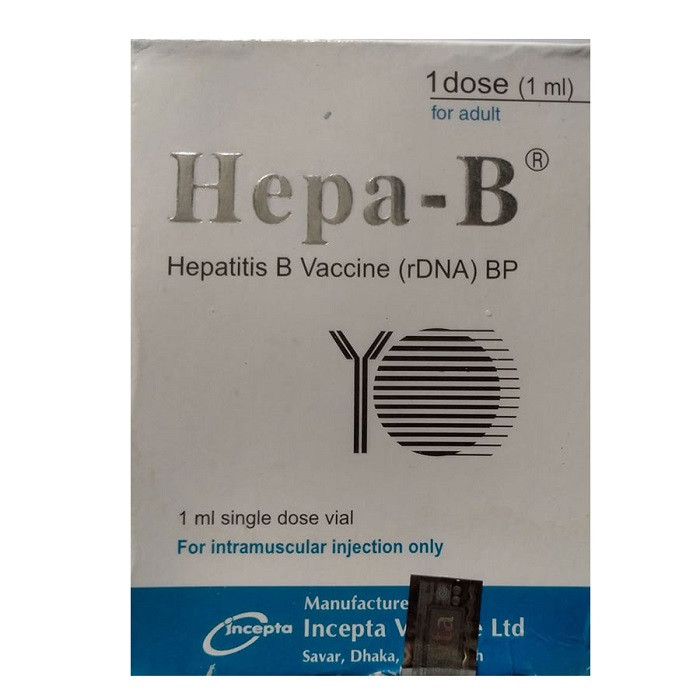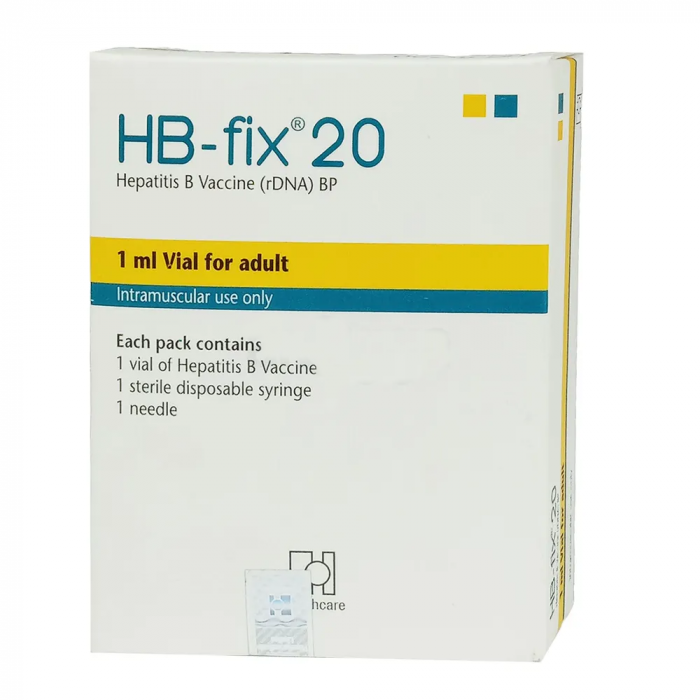
✔ 100% Authentic Product
👁️ Currently Viewing 3101
Hepa-B For Pediatric Vaccine 0.5ml
Hepatitis B Vaccine (rDNA) is used to prevent Hepatitis B infection. It helps develop immunity by initiating a mild, non-illness-causing infection, stimulating the body's immune system to produce protective antibodies.
Discount
Price: ৳ 428
MRP:
৳
450
5%
Off

100% Genuine Products, Guaranteed

Safe & Secure Payments, Always

Fast, Secure & Efficient Delivery

Proper Packaging
 Cash on Delivery - All over Bangladesh
Cash on Delivery - All over Bangladesh Regular Delivery - 12-24 Hours, Dhaka City* Charge Tk.39-59
Regular Delivery - 12-24 Hours, Dhaka City* Charge Tk.39-59 Regular Delivery - 24-48 Hours, Other Cities* Charge Tk.99-110
Regular Delivery - 24-48 Hours, Other Cities* Charge Tk.99-110
 ফ্রি ডেলিভারিঃ - ৯৯৯ টাকা+ অর্ডারে, ঢাকা
শহরে
ফ্রি ডেলিভারিঃ - ৯৯৯ টাকা+ অর্ডারে, ঢাকা
শহরে ফ্রি ডেলিভারিঃ - ২৯৯৯ টাকা+ অর্ডারে, ঢাকার
বাহিরে
ফ্রি ডেলিভারিঃ - ২৯৯৯ টাকা+ অর্ডারে, ঢাকার
বাহিরে
100% Genuine Products, Guaranteed
Safe & Secure Payments, Always
Fast, Secure & Efficient Delivery
Proper Packaging
 Cash on Delivery - All over Bangladesh
Cash on Delivery - All over Bangladesh Regular Delivery - 12-24 Hours, Dhaka City* Charge Tk.39-59
Regular Delivery - 12-24 Hours, Dhaka City* Charge Tk.39-59 Regular Delivery - 24-48 Hours, Other Cities* Charge Tk.99-110
Regular Delivery - 24-48 Hours, Other Cities* Charge Tk.99-110 ফ্রি ডেলিভারিঃ - ৯৯৯ টাকা+ অর্ডারে, ঢাকা
শহরে
ফ্রি ডেলিভারিঃ - ৯৯৯ টাকা+ অর্ডারে, ঢাকা
শহরে ফ্রি ডেলিভারিঃ - ২৯৯৯ টাকা+ অর্ডারে, ঢাকার
বাহিরে
ফ্রি ডেলিভারিঃ - ২৯৯৯ টাকা+ অর্ডারে, ঢাকার
বাহিরে
✅ Description:
The Hepatitis B Vaccine is a non-infectious recombinant DNA vaccine. It is a sterile suspension consisting of purified surface antigens from the hepatitis B virus. This antigen is obtained by culturing genetically engineered yeast cells (Saccharomyces cerevisiae), which carry the gene coding for the HBsAg. The HBsAg protein, produced in yeast cells, is purified through multiple physicochemical processes and then formulated as a suspension with the antigen adsorbed on aluminum hydroxide. No human-derived substances are used in the manufacturing process.
Safety Advices

Alcohol
UNSAFE
It is not known whether it is safe to consume alcohol with Hepatitis B Vaccine. Please consult your doctor.

Pregnancy
CONSULT YOUR DOCTOR
Hepatitis B Vaccine is generally considered safe to use during pregnancy. Animal studies have shown low or no adverse effects on the developing baby; however, there are limited human studies.

Breastfeeding
CONSULT YOUR DOCTOR
Hepatitis B Vaccine is probably safe to use during breastfeeding. Limited human data suggests that the drug does not represent any significant risk to the baby.

Driving
SAFE
Hepatitis B vaccine does not usually affect your ability to drive.

Kidney
SAFE IF PRESCRIBED
Hepatitis B Vaccine is safe to use in patients with kidney disease. No dose adjustment of the Hepatitis B Vaccine is recommended.
However, please inform your doctor if you have an underlying kidney disease.

Liver
SAFE IF PRESCRIBED
Hepatitis B Vaccine is probably safe to use in patients with liver disease. Limited data available suggests that dose adjustment of Hepatitis B Vaccine may not be needed in these patients. Please consult your doctor.
✔️ Uses:
To prevent Hepatiis B virus For active immunization against the, Hepatitis B infection
✔️ Composition
Each 0.5 ml dose contains more than 10 mcg of hepatitis B surface antigen adsorbed on Aluminium Hydroxide gel, equivalent to 0.25 mg of Al3+.
Each 1 ml dose contains more than 20 mcg of hepatitis B surface antigen adsorbed on Aluminium Hydroxide gel, equivalent to 0.5 mg of Al3+.
✔️ Pharmacology
Hepatitis B vaccines are utilized for active immunization against hepatitis B infection. These vaccines work by introducing the hepatitis B surface antigen (HBsAg) into the body. The HBsAg is adsorbed onto aluminum hydroxide or a similar adsorbent. When administered, the vaccine stimulates the immune system to produce antibodies against the HBsAg, thereby providing immunity and protecting the individual from future hepatitis B infections.
✔️ Tolerability and Reactions
Hepatitis B vaccine is generally well tolerated. Most recipients experience some reactions upon vaccination, which are typically mild and short-lived. These reactions primarily include local reactions at the injection site, such as erythema (redness), induration (hardening), and tenderness. Systemic reactions, such as malaise (general discomfort), headache, diarrhea, vomiting, myalgia (muscle pain), and elevated temperature, are reported less commonly. In very rare cases, allergic-type reactions, such as pruritus (itching), rash, and urticaria (hives), may occur.
✔️ Dosage Guidelines
Neonates, Infants, and Children up to 19 Years of Age:
- Recommended Dose: >10 mcg of antigen protein in 0.5 ml.
Adults 19 Years of Age and Older:
- Recommended Dose: >20 mcg of antigen in 1 ml.
✔️ Primary Immunization Schedule for All Ages
Standard Schedule (3 doses):
- First Dose: On the elected date.
- Second Dose: 1 month after the first dose.
- Third Dose: 6 months after the first dose.
✔️ Accelerated Schedule (4 doses):
- First Dose: On the elected date.
- Second Dose: 1 month after the first dose.
- Third Dose: 2 months after the first dose.
- Fourth Dose: 12 months after the first dose.
This accelerated schedule provides quicker protection and is expected to enhance patient compliance.
✔️ Neonates Born to Hepatitis B Surface Antigen-Positive Mothers (4 doses of 10 micrograms):
- First Dose: At birth with Hepatitis B immunoglobulin injection (at a separate site).
- Second Dose: 1 month after the first dose.
- Third Dose: 2 months after the first dose.
- Fourth Dose: 12 months after the first dose.
✔️ Travelers Departing Within 1 Month (Adults over 18 Years):
- First Dose: On the elected date.
- Second Dose: 7 days after the first dose.
- Third Dose: 21 days after the first dose.
- Fourth Dose: 12 months after the first dose.
✔️ Renal Insufficiency (Including Hemodialysis Patients) - Adults and Children Over 16 Years (4 doses of 40 micrograms):
- First Dose: On the appropriate date.
- Second Dose: 1 month after the first dose.
- Third Dose: 2 months after the first dose.
- Fourth Dose: 6 months after the first dose.
The immunization schedule and booster doses may need to be adjusted for individuals with low antibody concentrations.
✔️ Booster Vaccinations
For individuals with a normal immune status who have been vaccinated, the necessity of booster doses of the Hepatitis B vaccine has not been established. However, booster doses are recommended for hemodialysis patients and other immunocompromised individuals.
✔️ Administration:
Method of Administration:
- Route: Intramuscular injection only.
- Do Not: Inject intravenously.
- Injection Sites:
- Adults and Children (over 1 year): Deltoid muscle.
- Children (under 1 year): Anterolateral aspect of the thigh.
Preparation for Administration:
- Shake Well: Shake the vaccine well before use to obtain a homogenous, turbid white suspension. Avoid vigorous shaking.
- Visual Inspection: Inspect the vaccine visually for any particulate matter and discoloration before administration. Do not use the vaccine if these conditions are present.
- Usage: Use the vaccine as supplied without any dilution.
Co-Administration:
- Simultaneous Administration: Hepatitis B vaccine can be administered concurrently with other vaccines, such as Diphtheria, Tetanus, Pertussis (DTP), Polio (OPV), Measles, Mumps and Rubella (MMR), Haemophilus influenzae b, Hepatitis A, and BCG vaccines. Administer these vaccines at separate sites using separate syringes.
- Do Not Mix: Do not mix the Hepatitis B vaccine with other vaccines or medicinal products in the same syringe.
✔️ Interaction
Reduced response to vaccination when used concurrently with immunosuppressants such as corticosteroids or antineoplastics.
✔️ Contraindications
Hypersensitivity to any component of the vaccine, including yeast, is a contraindication. This vaccine is contraindicated in patients with previous hypersensitivity to any Hepatitis B virus-containing vaccine.
✔️ Pregnancy & Lactation
The effect of Hepatitis B on fetal development or reproduction capacity has not been evaluated. However, it should only be used during pregnancy when there is a high risk of infection. Adequate human data on use during lactation and adequate animal reproduction studies are not available. It may be administered to nursing mothers only if needed.
✔️ Precautions & Warnings
If any alcohol or disinfectant is used for cleansing the skin it should be allowed to evaporate before vaccination otherwise inactivation of live vaccines may occur. Lactation: not known if excreted in breast milk
✔️ Storage Conditions:
Keep out of the reach and sight of children. Store at +2°C to +8°C. Transportation should also be at +2°C to +8°C. Protect from light. Do not freeze.
⚠️Disclaimer:
At ePharma, we’re committed to providing accurate and accessible health information. However, all content is intended for informational purposes only and should not replace medical advice from a qualified physician. Please consult your healthcare provider for personalized guidance. We aim to support, not substitute, the doctor-patient relationship.








